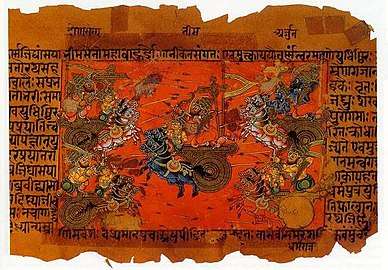Shurasena
Shurasena (Sanskrit: शूरसेन, Śūrasena) was an ancient Yadava ruler of Mathura[1][2][3] after whom the Surasena Kingdom or mahajanpada and the Yadava sept of Surasenas [4] were named.
| Shurasena | |
|---|---|
| In-universe information | |
| Children | Vasudeva, Kunti |
.png)
Shurasena Mahajanapada was one of sixteen most powerful and vast kingdoms and republics of the era, located mainly across the fertile Indo-Gangetic plains, there were a number of smaller kingdoms stretching the length and breadth of Ancient India.
Shurasena was father of Vasudeva (father of Krishna)and Kunti.[5] He is extensively mentioned in both the Mahabharata and the Puranas as the father of Vasudeva (father of Krishna) and Kunti (mother of Pandavas).
References
- "During the Mahabharata age the region around Mathura was ruled by the yadava dynasty." The Quarterly Review of Historical Studies, By Institute of Historical Studies (Calcutta, India),Published by Institute of Historical, Studies., 1983, Item notes: v.22, Original from the University of Michigan, Digitized 29 Aug 2008
- "Surasena was a Yadava. One of his descendants could, therefore, call himself a Yadava or a Surasena as he liked..." Chauhān Dynasties: A Study of Chauhān Political History, Chauhān Political Institutions, and Life in the Chauhān Dominions, from 800 to 1316 A.D., By Dasharatha Sharma, pp 103, Published by Motilal Banarsidass, 1975
- Tales From the Mahabharat, pp31, By B.K. Chaturvedi, Published by Diamond Pocket Books (P) Ltd. ISBN 81-288-1228-9, ISBN 978-81-288-1228-6
- "As Bhadanaka-desa was almost coterminous with Surasena janapada, we may designate the Apabhramsa of the area as Apabhramsa..." Early Chauhān Dynasties: A Study of Chauhān Political History, Chauhān Political Institutions, and Life in the Chauhān Dominions, from 800 to 1316 A.D., By Dasharatha Sharma, pp 103, Published by Motilal Banarsidass, 1975
- Swami Vijnanananda (2008) [1921]. The S'rimad Devi Bhagawatam. Volume I. BiblioBazaar, LLC. p. 334. ISBN 978-1-4375-3059-9.
This article is issued from Wikipedia. The text is licensed under Creative Commons - Attribution - Sharealike. Additional terms may apply for the media files.

